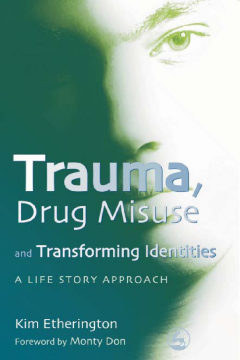
Additional Information
Book Details
Abstract
Looking at the life stories of ex-drug misusers in their own words, this book offers insights into the nature of addiction and how it can be tackled. It examines the links between early childhood experiences and drug misuse and also shows pathways to recovery and transformation.
Kim Etherington highlights the therapeutic value of listening to drug misusers' life stories and the importance of understanding how social environments and the wider cultural influences shape people's lives. She encourages people working with drug misusers to challenge pathologising notions of `spoiled identity', which assume that identity is fixed. By taking a step back and separating the person from the problem, it is possible to help them explore their relationship with drugs in ways that encourage a stronger sense of agency and power to change.
With compelling first-hand narratives and practical strategies to encourage drug misusers' ability to recover, this is essential reading for professionals working with drug users as well as people misusing drugs themselves.
This stimulating book shows how children construct their identities from their experiences, how trauma disrupts this development and how drugs misuse can become the way they adapt to extreme situations. It also shows how drug misusers have used their own experiences and resources to eventually form healthy identities. Essential reading.
Therapy Today
Kim Etherington is a Professor in the Graduate School of Education, University of Bristol and a private counselling and supervision practitioner. For 12 years she has been supporting people who work with drug misusers in the Southmead Drugs project, a community-based project in a deprived area of Bristol. The project was awarded the Queens medal in 2004. She is the author of Becoming a Reflexive Researcher - Using Our Selves in Research and Narrative Approaches to Working with Adult Male Survivors of Child Sexual Abuse, and the editor of Counsellors in Health Settings, Rehabilitation Counselling in Physical and Mental Health and Trauma, the Body and Transformation, all published by Jessica Kingsley Publishers.
I welcome this study by Professor Kim Etherington because it is part of the process of understanding our drug problem and the whole chain of issues that lead to addiction. It is the stories of real people, and in doing so it holds a mirror not just to other people's lives but to our own.
from the foreword by Monty Don, The Monty Project, UK
The combination of the courageous revelations of the contributors and Etherington's careful and considered research approach is to be valued and prized... I hope this book is read by those in power, those who believe they know what to do with addicts... Congratulations to Kim Etherington and gratitude to the participants.
Healthcare Counselling and Psychotherapy Journal
With each reading, I have come into contact with a further dimension of the book that I had previously not encountered. It is, without a doubt, a valuable resource for anyone wanting to move beyond the familiar stories commonly associated with drug misusers. I suggest it would be an excellent core text for students interested in gaining a more enriched understanding of how social and cultural factors can impact on an individual's life. In addition, there is much within this book that offers support to those currently negotiating their own difficult relationship with drugs as well as professionals wanting to enhance their work within the field of drug misuse... I have no hesitation in recommending this book. It is an inspirational, multilayered book that offers much to a wide range of readers.
Escalate
If this book were made a compulsory read the helping professions might encourage more inclusive practice. I will certainly add it to the various reading lists under my influence as an educator. The core of the book, and its impact, comes from the experts by experience, who chart our journey through the underworld of human suffering. If that sounds extreme, I dare you to read it. As ever, when you really stop and listen you hear the patterns of abuse that underpin the seemingly random behaviour of the more obviously distressed. And for those of you who find comfort and refuge in diagnostic labels, be prepared to feel uneasy. This is the world of relating where little comes between you and the horror of the other person's life experience. You might want to cry or switch off for a while, but hopefully you will continue to see the person in the story... This book left me full of hope. Is there anything more awesome than bearing witness to the human spirit restoring itself from having been broken?
Drugs and Alcohol Today
